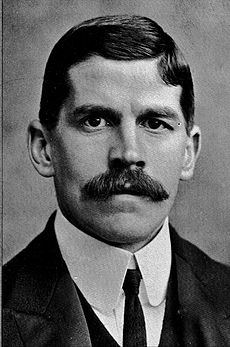- Charles Wreford-Brown
-
Charles Wreford-Brown 
Personal information Full name Charles Wreford-Brown Born 9 October 1866
Clifton, Bristol, EnglandDied 26 November 1951 (aged 85)
Bayswater, London, EnglandBatting style Right-handed Bowling style Slow right-arm Role Bowler Domestic team information Years Team Gloucestershire Oxford University Career statistics Competition FC Matches 19 Runs scored 252 Batting average 9.69 100s/50s 0/? Top score 51 Balls bowled Wickets 39 Bowling average 24.84 5 wickets in innings 1 10 wickets in match 0 Best bowling 5/62 Catches/stumpings Source: [Cricinfo], 6 February 2008 Charles Wreford-Brown (9 October 1866 – 26 November 1951) captained the England national football team and was a county cricketer during the Victorian age, and later acted as a sports legislator during the 20th century. Wreford-Brown is usually credited with inventing the term soccer as an abbreviation for association football.[1]
Contents
Privileged upbringing and Amateur status
Wreford-Brown was born in Bristol went to Charterhouse School before studying at Oriel College, Oxford. Given his privileged economic status at the time of the rise in the popularity of football, Wreford-Brown was one of a select few who were able to play sports for no monetary gain whatsoever.
The educated belief in the purity of a noble athletic spirit untainted by the corrupting influence of money was embodied within the rise of the Corinthians football club who Wreford-Brown played for in the 1890s. Indeed, in 1906 Wreford-Brown was one of the leading figures in the movement to create the Amateur Football Alliance in London in order to keep the amateur game separate from the Football Association, an organisation that the amateur clubs found to be increasingly driven by the financial gain of the professional clubs.[2][3]
Sporting Achievement
He was a keen sportsman and played both cricket and football for the university.[4] He also later played cricket for Gloucestershire. His younger brother, Oswald (who died during the first World War in 1916) and son Anthony would, like him, also play for first-class cricket but none were stand-outs with the willow.
However it is as a footballer that he is more recognised. He first played as a goalkeeper but played initially as a stop-gap but later as the mainstay centre-half for the Old Carthusians (the club for ex-Charterhouse boys) (appearing against them in the 1896 London Charity Cup Final,[5] Clifton Association (the Association which took in Bristol and its environs and with whom he played in the inaugural Gloucestershire Cup), as well as the Corinthians and captained England twice against Wales in 1894 and 1895 (when the team consisted entirely of amateur players).
Steve Bloomer, one of the leading "players" (professionals) on the England team, recorded in a memoir that, as captain, the patrician Wreford-Brown on one occasion took to the field with a deep pocket in his shorts filled with gold sovereigns and pressed one of the coins into the hand of each professional goalscorer after the man had netted.
Legislator
He was first appointed to the council of The Football Association to represent the Old Carthusians in 1892 but soon after served as the representative for Oxford University, a position he held until his death some 59 years later. He later became Chairman of the International Selection Committee for England within the Football Association.[6]
He was in attendance at the first meeting of the Athenian League on 27 May 1914.[7] He served as a vice-president of the FA from 1941 until his death in 1951, under Sir Stanley Rous, secretary of the Association. They have been credited with guiding the Association toward a more educated position, promoting youth coaching and training just before hostilities in 1939.[8]
He was also a keen chess player. He took part in the 1933 British Chess Championship, though he had to drop out through illness after two rounds (he had won the first game and drawn the second).
References
- Needham, Ernest (2003) [1901]. Association Football. Cleethorpes: Soccer Books. ISBN 1-86223-083-8.
- Seddon, Peter (1999). Steve Bloomer: The Story of Football's First Superstar. Derby: Breedon Books. ISBN 1-85983-146-X.
- Byrne, Stephen; Jay, Mike (2003). Bristol Rovers Football Club - The Definitive History 1883-2003. Stroud: Tempus. ISBN 0-7524-2717-2.
Notes
- ^ "The Internet Public Library". Ipl.org. http://www.ipl.org/div/pf/entry/78532. Retrieved 2011-07-08.
- ^ [Association Football] (1960) p. 366
- ^ Rogers, Martin. "It’s football to you, soccer to me". Yahoo.com, July 1, 2010
- ^ "Charles Wreford-Brown | Cricket Players and Officials | ESPN Cricinfo". Content-www.cricinfo.com. http://content-www.cricinfo.com/ci/content/player/23204.html. Retrieved 2011-07-08.
- ^ [Association Football] (1960) p. 273
- ^ [Association Football] (1960) p. 392
- ^ Association Football (1960) p. 300
- ^ Association Football] (1960), p. 79
Categories:- 1866 births
- 1951 deaths
- People from Bristol
- Pre-1914 association football players
- England international footballers
- English footballers
- Oxford University A.F.C. players
- Corinthian F.C. players
- English cricketers
- Gloucestershire cricketers
- Oxford University cricketers
- Old Carthusians
- Alumni of Oriel College, Oxford
- Amateur chess players
Wikimedia Foundation. 2010.
